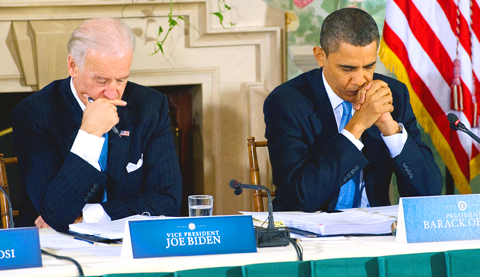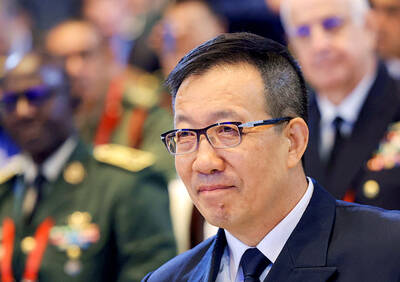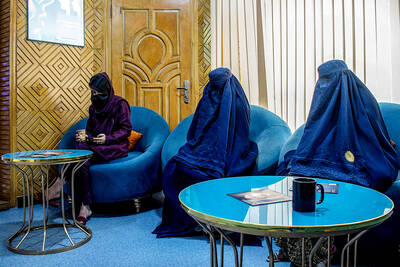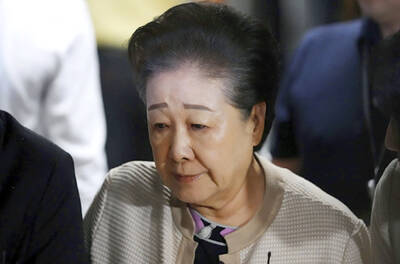US President Barack Obama’s high-stakes health summit failed on Thursday to break an impasse over his historic reform drive, prompting him to warn he would press on with or without Republican help.
Civility largely prevailed at the grueling daylong meeting, after Obama warned against “political theater,” but there was no breakthrough on sharp ideological disputes threatening to suffocate his ambitious presidency.
The more than six hours of back-and-forth exchanges between top Republicans and Democrats were unique in political history, and came after a poisoned year-long debate over health care.

PHOTO: AFP
Obama hinted at the talks at Blair House opposite the White House that he would seek to drive the massive reform bid through Congress even without Republican votes, which his foes flatly stated would not be forthcoming.
Few analysts expected the meeting would yield major progress, and for both sides it was as much about political positioning and setting the terrain for mid-term congressional polls in November as finding compromise.
But Obama said at the outset: “I hope that this isn’t political theater, where we’re just playing to the cameras and criticizing each other, but instead are actually trying to solve the problem.”
It was not immediately clear however if the move would buy Obama time to thrust his bill through Congress, or credit from voters for providing the bipartisan outreach they tell pollsters they crave.
Obama challenged Republicans to drop obstruction tactics and back the latest version of his new US$950 billion plan to cover 31 million uninsured Americans, cut abuses by the vast insurance industry and lower premiums.
He cited possible deals between Democratic and Republican leaders on issues like medical malpractice, the insurance market and health care costs, but admitted that other gaps were so wide they may not be bridged.
“Is there enough serious effort, that in a month’s time, or in a few weeks’ time, or six weeks’ time, we could actually resolve something?” Obama asked.
“If we can’t — then I think we have to go ahead and make some decisions and then that is what elections are for,” he said, raising the prospect of a hardball political strategy.
Although crediting Obama for holding the meeting, Republicans rejected his approach.
“Frankly, I was discouraged by the outcome,” Republican Senate minority leader Mitch McConnell told reporters. “I think it is pretty clear that the majority, including the president, want to continue the same bill. I do not believe there will be any Republican support for this 2,700-page bill.”
Republican Senator Jon Kyl of Arizona, faulted Obama’s approach.
“I just don’t think the president was listening, even though he invited us to hear our ideas,” Kyl said. “There are some fundamental differences of opinion ... It is not going to be possible with that kind of an approach to come together within the timeframe that he indicated.”
Republican Representative Eric Cantor, however, said he was “hopeful, maybe, that the president will take the message from the American people to set this bill aside.”
“There was adequate airing of views on both sides,” he said.
Obama said health reform was crucial to alleviating deficits and to the future health of the US economy, and was a moral imperative with millions of Americans hit by medical bills they cannot pay.
But Republicans demanded he ditch his ambitious plan and start again.
The House and Senate have failed to agree a single piece of legislation for Obama to sign into law.

BEIJING FORUM: ‘So-called freedom of navigation advocated by certain countries outside the region challenges the norms of international relations,’ the minister said Chinese Minister of National Defense Dong Jun (董軍) yesterday denounced “hegemonic logic and acts of bullying” during remarks at a Beijing forum that were full of thinly veiled references to the US. Organizers said that about 1,800 representatives from 100 countries, including political, military and academic leaders, were in Beijing for the Xiangshan Forum. The three-day event comes as China presents itself as a mediator of fraught global issues including the wars in Ukraine and Gaza. Addressing attendees at the opening ceremony, Dong warned of “new threats and challenges” now facing world peace. “While the themes of the times — peace and development —

Venezuela on Saturday organized a day of military training for civilians in response to the US deployment in the Caribbean, and amid new threats from US President Donald Trump. About a month ago, Washington deployed warships to international waters off Venezuela’s coast, backed by F-35 jets sent to Puerto Rico in what it calls an anti-drug and anti-terrorism operation. Venezuelan Minister of Defense Vladimir Padrino Lopez has accused Washington of waging “undeclared war” in the Caribbean, after US strikes killed over a dozen alleged drug traffickers off his country’s coast. Caracas also accused the US of seeking regime change, and

Decked out with fake crystal chandeliers and velvet sofas, cosmetic surgery clinics in Afghanistan’s capital are a world away from the austerity of Taliban rule, where Botox, lip filler and hair transplants reign. Despite the Taliban authorities’ strict theocratic rule, and prevailing conservatism and poverty in Afghanistan, the 20 or so clinics in Kabul have flourished since the end of decades of war in the country. Foreign doctors, especially from Turkey, travel to Kabul to train Afghans, who equally undertake internships in Istanbul, while equipment is imported from Asia or Europe. In the waiting rooms, the clientele is often well-off and includes men

BRIBERY ALLEGATIONS: A prosecutor said they considered the risk of Hak-ja Han tampering with evidence to be very high, which led them to seek the warrant South Korean prosecutors yesterday requested an arrest warrant for the leader of the Unification Church, Hak-ja Han, on allegations of bribery linked to the country’s former first lady and incitement to destroy evidence. The move came a day after the 82-year-old was questioned over her alleged role in bribing former first lady Kim Keon-hee and a lawmaker. Founded in 1954 by her late husband, Sun Myung Moon, the Unification Church has long been the subject of controversy and criticism, with its teachings centered on Moon’s role as the “second coming” and its mass weddings. Followers are derisively referred to as “Moonies.” However, the church’s